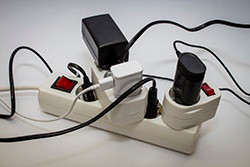 Charging your phone, making coffee, doing laundry, watching TV, working on the computer, simply turning on a light…you use electricity in so many ways each and every day. But the dangers associated with electricity – fires, accidents, electrocutions – pose a significant risk to your home and family.
Charging your phone, making coffee, doing laundry, watching TV, working on the computer, simply turning on a light…you use electricity in so many ways each and every day. But the dangers associated with electricity – fires, accidents, electrocutions – pose a significant risk to your home and family.
The National Fire Protection Association (NFPA) reports an average of 47,820 reported home structure fires annually involving electrical failure or malfunction. These fires caused 455 deaths, 1,518 injuries, and over $1.5 billion in direct property damage.
Many of these fires and other electrical accidents can be prevented by understanding and following basic electrical safety practices. Consider the following tips and resources to help make electrical safety part of your personal risk management strategy.
Extension Cords
Improper use of extension cords can put your home and family at risk. According to ESFI, approximately 3,300 home fires originate in extension cords annually. These fires kill 50 people and injure 270 more. Additionally, emergency rooms treat 4,000 injuries related to extension cords annually. So before you grab an extension cord, consider these tips from Electrical Safety Foundation International (ESFI) to protect your home and family:
- Don’t attempt to plug extension cords into one another
- Make sure extension cords are properly rated for their intended use, indoor or outdoor, and meet or exceed the power needs of the device being used
- Keep all outdoor extension cords clear of snow and standing water
- Do NOT overload extension cords
- A heavy reliance on extension cords is an indication that you have too few outlets to address your needs. Have additional outlets installed where you need them
- Inspect cords for damage before use. Check for cracked or frayed sockets, loose or bare wires, and loose connections
- Do NOT nail or staple extension cords to walls or baseboards
- Do NOT run extension cords through walls, doorways, ceilings, or floors. If a cord is covered, heat cannot escape, which may result in a fire hazard
- Never use three-prong plugs with outlets that only have two slots. Never cut off the ground pin to force a fit, which could lead to electric shock
- Buy only cords that have been approved by an independent testing laboratory
- Do NOT substitute extension cords for permanent wiring
- Do NOT use an extension cord or power strip with heaters or fans, which could cause cords to overhead and result in a fire
Don’t Overload Your Home
A major cause of home fires is overloaded electrical circuits. How can you lower your risks of electrical fires? Pay attention to the waiting signs and take steps to prevent electrical overloads. Consider the following tips from ESFI:
Overloaded circuit warning signs:
- Flickering, blinking, or dimming lights
- Frequently tripped circuit breakers or blown fuses
- Warm or discolored wall plates
- Cracking, sizzling, or buzzing from receptacles
- Burning order coming from receptacles or wall switches
- Mild shock or tingle from appliances, receptacles, or switches
How to prevent electrical overloads:
- Never use extension cords or multi-outlet converters for appliances
- All major appliances should be plugged directly into a wall receptacle outlet. Only plug one heat producing appliance into a receptacle outlet at a time
- A heavy reliance on extension cords is an indication that you have too few outlets to address your needs. Have a qualified electrician inspect your home and add new outlets
- Power strips only add additional outlets; they do not change the amount of power being received from the outlet
Call An Electrician!
Understanding how to safely use extension cords and avoiding overloaded circuits are important aspects of electrical safety. But above all, one the best ways to keep your home safe from electrical dangers is to hire an electrician for any electrical work needing to be completed in your house. And make sure they are qualified and licensed!
Additional Resources
- NFPA’s Electrical Safety Tips
- The U.S. Fire Administration’s Electrical Fire Safety Handout and Infographic
- S. Consumer Product Safety Commission’s Electrical Safety Guides and Home Electrical Safety Checklist
Don’t overlook electrical safety in your personal risk management strategy. Protect your family and home from electrical fires, accidents, and electrocutions by learning the basics of electrical safety and always having electrical work done by a qualified electrician.



